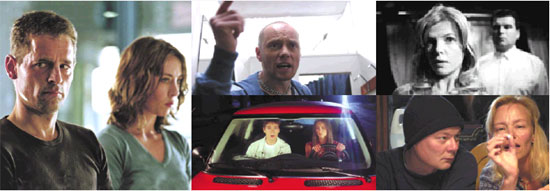|
|
< |
 |
|
|
|
Regiedebütanten erobern die Leinwand | First-time Directors to the Fore
Auffällig an der diesjährigen nordischen Spielfilmproduktion ist die hohe Zahl an Debütfilmen. Aus Dänemark kommt ein spannender Politthriller über eine innerparteiliche Verschwörung: Königsspiel (Kongekabale), das Debüt von Nikolaj Arcel: Der junge Journalist Ulrik Torp (Anders W. Berthelsen) muss erkennen, dass niemand ein Interesse an der Aufdeckung des Komplotts hat. Ein weiterer herausragender Film aus Dänemark
ist Lasset die Kinder (Lad de små børn), das Regiedebüt der renommierten Schauspielerin Paprika Steen: Nach dem Verlust ihres Kindes kämpfen Claes und Britt um die Überwindung der Trauer und um einen Weg zurück zueinander und zum Leben.
Aus Norwegen kommen zwei weitere Erstlingswerke. Shooting Star Aksel Hennie hat jahrelang an einem Drehbuch über das schwierige Osloer Stadtviertel gearbeitet, in dem er selbst aufwuchs. In Uno übernahm er Regie und Hauptrolle: ein ergreifendes Drama, angesiedelt im Milieu der Bodybuilder, Kleinkriminellen und Drogendealer. Bázo ist die erste Spielfilmregie des schwedischen Dokumentarfilmers Lars Göran Pettersson: Alle glauben, dass Emil
„bázo“ – leicht behindert – ist, weil er weder lesen noch schreiben kann. Wer aber versucht, Emil zu benachteiligen, muss erfahren, dass er sich auf clevere Weise zu wehren weiß.
Island wird in diesem Jahr für seine 25-jährige Filmproduktion gewürdigt. Kaltes Licht (Kaldaljós) hat das Geheimnisvolle, die Authentizität und die erstaunlichen Naturszenerien, die wir von einem isländischen Film erwarten. Hilmar Oddsson (Spurlos, Tränen aus Stein) zeigt hier einen Maler (Ingvar E. Sigurdsson), der als Kind von düsteren Visionen und später von Schuldgefühlen geplagt wird.
Peter Dalle hat mit Illusive Tracks (Skenbart) ein schwedisches „Rail Movie“ vorgelegt: Eine makabre schwarzweiße Komödie, die sich kurz nach Ende des Zweiten Weltkrieges in einem Zug nach Berlin abspielt. In dieser skurrilen Mordgeschichte herrscht das Chaos.
Zwei der besten Filme aus dem Baltikum kommen in diesem Jahr aus Estland, Revolution der Schweine und Set Point. Revolution der Schweine, das Debüt der Autoren und Regisseure René Reinumägi und Jaak Kilmi, ist eine Jugendkomödie, die in einem sommerlichen Schülercamp angesiedelt ist – im Jahr 1986, als das kommunistische System zu bröckeln beginnt. Set Point, inszeniert von Ilmar Taska und produziert von seinem Sohn Kristian
Taska (Namen in Marmor), untersucht als psychologischer Thriller eine Gesellschaft auf dem Weg zur Anpassung an den westlichen Lebensstil.

Aftermath, Uno (above), Set Point (below), Illusive Tracks (above), Bázo (below)
The most conspicuous aspect of this year’s crop of feature films is the great number of directorial debuts by promising newcomers. From Denmark comes an exciting political thriller about an innerparty conspiracy: King’s Game (Kongekabale), the debut feature film of Nikolaj Arcel: Young journalist Ulrik Torp (Anders W. Berthelsen) suddenly finds that no one has any interest in getting to the heart of the story. Another excellent film from Denmark is
Aftermath (Lad de små børn), the directorial debut of the acclaimed actress Paprika Steen: After losing their only child in a car accident, Claes and Britt struggle to overcome their grief and find their way back to each other and to life. Two further feature film debuts come from Norway. Shooting Star Aksel Hennie has been working for years on a script about the tough quarter of Oslo from where he himself grew up. He directs and stars in Uno, a gripping drama set in the
milieu of body builders, petty criminals and drug dealers. Bázo is the first feature of Swedish documentist Lars Göran Pettersson. Everybody thinks that Emil is “bázo” – slightly retarded – because he can neither read nor write. But when people start to take advantage of him, they learn that Emil is not only a formidable enemy, but a very clever guy, as well.
Iceland is being featured in Lübeck this year on the occasion of their 25th year of film production. Cold Light (Kaldaljós) has all of the mystery, authenticity and stunning natural settings we have come to expect from Icelandic films. Hilmar Oddsson (best known for No Trace and Tears of Stone) has written and directed the film about a painter (Ingvar E. Sigurdsson) who is plagued by visions of the future and guilt about the past. Peter Dalle’s
Swedish production Illusive Tracks (Skenbart) is a kind of “rail movie”, a very black black-and-white comedy that takes place on a train bound for Berlin shortly after the end of the Second World War. Chaos reigns in this delightfully audacious murder story.
The Baltic film industry is undergoing a renaissance and two of this year’s best films come from Estonia: Revolution of Pigs and Set Point. Revolution of Pigs, the debut feature film of writers/ directors René Reinumägi and Jaak Kilmi, is a comedy of youth set in a student summer camp in 1986 when the Communist system is beginning to crumble. Set Point, directed by Ilmar Taska and produced by his son Kristian Taska (Names in Marble), is a
psychological thriller examining life in a society now merging with the West.
|



